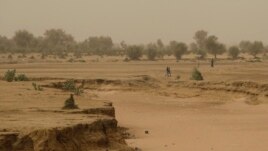14 July, 2017
The Sahel is one of driest areas in Africa, but that may change if Earth's surface temperatures rise more than two degrees Celsius.
Scientists say the Sahel could turn greener, with more plant life, because the higher temperatures would lead to more rainfall.
More than 100 million people live in the Sahel. It stretches coast to coast -- from Mauritania and Mali in western Africa to Sudan and Eritrea in the east. The Sahel extends to the southern edge of the Sahara desert.

Africa's Sahel Region
In recent years, the area has experienced worsening extreme weather. That includes more droughts -- periods of little or no rainfall.
Some scientists are very concerned about pollution from greenhouse gases - gases that trap heat in Earth's atmosphere. They warn that if such gases continue to increase with no limits, rising temperatures could change weather systems in the Sahel and other areas. Scientists say this is possible if surface temperatures rise more than two degrees Celsius above average temperatures before the industrial revolution.
Competing rainfall models
Some weather models predict a small increase in rainfall for the Sahel. But there is a risk that the entire weather pattern will change by the end of the century. That is the opinion of researchers at the Potsdam Institute for Climate Impact Research.
The size of the possible change is "mind-boggling," says the institute's Anders Levermann. "This is one of the very few elements in the Earth system that we might witness tipping soon." Levermann also works for Columbia University in New York City.
If the Sahel receives more rainfall, it will mean more water for agriculture, industry and personal use. But in the first few years leading up to more rain, the area is likely to experience very erratic weather. That may mean extremely dry periods followed by destructive floods, the researchers said.
Hard for people to plan
They added that because it is hard to know what will happen when, it makes it hard for people to plan for these changes.
Levermann said any extreme change would create a huge challenge to the Sahel. More than 100 million people who may be affected already face many "instabilities, including war," he said.
The area faces many conflicts, including some driven by groups such as Boko Haram and al Qaeda in the Islamic Maghreb.
The researchers studied rainfall in the Sahel during the months of July, August and September. That is the time of year when the area gets most of its rain.
There are a number of possible outcomes, which depend on the climate that eventually develops... and whether people in the Sahel are prepared for changes, said scientist Jacob Schewe. "Climate change from burning fossil fuels "really has the power to shake things up," he told the Thomson Reuters Foundation.
A report on the study was published this month in Earth System Dynamics, a journal of the European Geosciences Union.
I'm Dorothy Gundy.
This story came from the Reuters news service. Anne Ball adapted the report for VOA Learning English. George Grow was the editor.
We want to hear from you. Write to us in the Comments Section and visit us on 51VOA.COM.
_____________________________________________________________
Words in This Story
pattern – n. a repeated form or design; something used as a model
mind-boggling – adj. emotionally or mentally exciting
tip – v. to move the balance of power or influence
erratic – adj. having no fixed path or direction
challenge – n. a difficult problem or issue
fossil fuel – n. a fuel formed in the earth from plant or animal remains